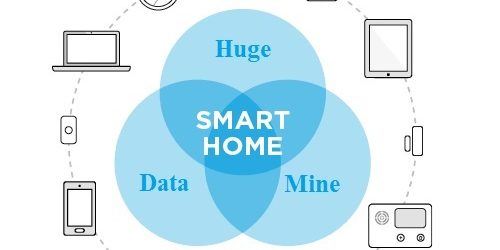Smart Homes Are Huge Data Mines (Part II)
Smart home, big data mine
Consider how much information could be collected by your household electronics. Your washing machine can record what time it is run, how many loads it has washed, and detergent used. Samsung would love to have this information, it would make it easier for their engineers to design a better machine or even worse, a machine that is prone to breaking down and therefore needs to be replaced. Your refrigerator could record how many times you’ve opened it, how long you leave the door open, how much you use the water/ice dispenser and replace the filter, and record the temperature at all times. This information, though seemingly useless, would also be valuable to manufactures. Ask yourself, aren’t your habits your personal information?
Smart devices tend to do one other thing as well – show ads. Showing ads is probably one of the most profitable aspects of data mining. All the data collected is used to build a consumer profile. Your smart devices might start hounding you with unrelated ads. But as it figures out who you are, it will start tailoring ads to your demographic. Maybe you’re a young adult male who like to drink plenty of water and ice – your smart fridge can in theory, figure this out by collecting usage data. Or maybe it allows you to sign in with a smart fridge user profile, allowing you to save your water and ice preferences.
Wouldn’t it be interesting if your smart devices allowed you to sign in with your Samsung, Google, or social media account? All that data could be collected for enormous profits. One day this personal data will also leak out on the internet. It may seem silly that your water and ice preferences are worth some amount of money, but stupid videos are already worth millions of dollars on YouTube. It’s not unconceivable that your personal information regarding your habits and preferences be valuable as well. Social media is one thing, but what if every little personal detail about you was leaked online? Wiperts can help you now and in the future combat this invasion of privacy.
A theoretical example of the future
A household of four family members live in a smart home. Two adults – Derek and Rebecca, live with their two kids – Anthony and Evian. They all have smartphones and use social media connected IoT smart devices. Stalkers, fraudsters, and criminals in general would love to know this deeply personal information. For example, what time do the family members enter the house? The smart doors – front, back, and garage – would know this. Biometric data such as fingerprints, iris scanners, or facial recognition could be used to open the smart doors. All this biometric data would all be deeply personal information connected to names, dates of birth, and gender.
Apple and other companies may claim their facial recognition and fingerprint scanners are impregnable, but their older devices have been hacked by law enforcement agencies and grey hat hackers time and time again. Cyber criminals can use computers too. Think about your garage door – it is pretty old hardware isn’t it? It works and is reliable, can be broken into, but probably doesn’t need replacing. Digital hardware becomes quickly obsolete however. Instead of expensive lock picks and big chain cutters, criminals might just download a hacking app that allows them to hack this household’s old smart lock. No matter how many updates a smart lock receives over the internet, its hardware will be limited the moment it is manufactured – therefore its encryption and security will eventually become obsolete.
Burglars would love to know this private information even more than big companies. Being able to mimic someone’s biometric data is something out of spy movies. Instead of using the body part, they could just send the data directly into the system using a simple hack instead of hacking the entire authentication system. Science fiction often becomes reality. We all dreamed of communicating at the speed of light a few decades ago, which is exactly what smartphones do.
It’s imaginable that this personal information could leak out – data logs that look like gibberish but are actually entry and exit logs with names, addresses, and biometric data somewhere in the mix get posted on some obscure website. Sophisticated criminals would decipher this information and use it against this family. Criminals could break into their home or commit identity fraud elsewhere. Biometric data will become a big source of income for mega corporations and criminals alike. If it’s digital, it can be packaged and sold online.
Biometric data, smart device data, and general information about family members are all types of personal information. One day this information will leak out on Google and other data broker websites. When that day comes, Wiperts will be there to help.
Info@wiperts.com








